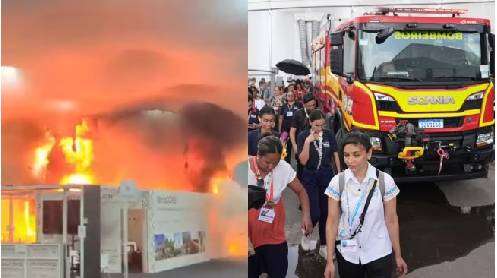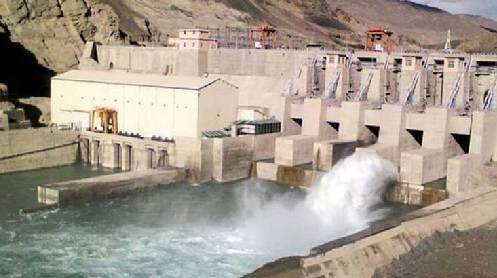BELEM: Negotiations at the COP30 climate summit were abruptly disrupted on Thursday when a fire broke out inside the venue, forcing thousands of delegates to evacuate just as talks entered a critical phase. The incident came with less than 24 hours remaining for nearly 200 countries to reach a consensus on strengthening global climate commitments.
Earlier in the day, UN Secretary-General António Guterres had urged negotiators to deliver a meaningful deal in Belem, praising growing calls for clarity on transitioning the world away from fossil fuels—a key point of contention at the summit.
Security footage showed flames igniting inside an exhibition pavilion and rapidly climbing the fabric-lined walls and ceiling before being extinguished. Organisers said 13 people were treated for smoke inhalation. The fire department attributed the blaze to electrical equipment, likely a microwave, and said it was contained within six minutes.
Delegates were evacuated as security personnel formed barriers across the hallways. Negotiations are not expected to resume until Friday morning, according to sources, although consultations between the presidency and negotiating blocs may continue depending on safety assessments.
The summit had already missed its Wednesday deadline to resolve disagreements over climate finance and the global shift away from fossil fuels. Brazil circulated a draft proposal on Thursday that omitted a roadmap for phasing out fossil fuels, despite emissions from their use being the leading driver of global warming.
The draft—seen by some governments but not all—proposed tripling funding for climate adaptation by 2030, based on 2025 levels. It did not specify whether wealthier nations would directly contribute or whether funds would come from development banks or private sources. Brazil’s COP30 presidency did not comment on the draft.
The talks remain gridlocked over two core issues: fossil fuel transition and climate finance. Developed and developing nations have joined Brazil in advocating for a roadmap to move away from fossil fuels, but several major producers oppose such commitments. While COP28 agreed to a transition, countries have yet to agree on timelines or mechanisms.
Another major sticking point is adaptation financing. Developing nations say they cannot leave Belem without substantial commitments, especially given growing climate impacts and mistrust stemming from unmet previous pledges—including the $300 billion climate finance target announced at COP29.
“Our people are losing their lives and livelihoods from storms of unprecedented strength,” said Steven Victor, Minister for Palau. “If we leave Belem without a transformative outcome on adaptation for the world’s most vulnerable, it will be a failure.”
European negotiators acknowledge the need for adaptation funds but say they lack authorization to commit to new targets.
Despite the deep divides, Guterres remained cautiously optimistic: “I am perfectly convinced that a compromise is possible,” he said.
By Reuters







